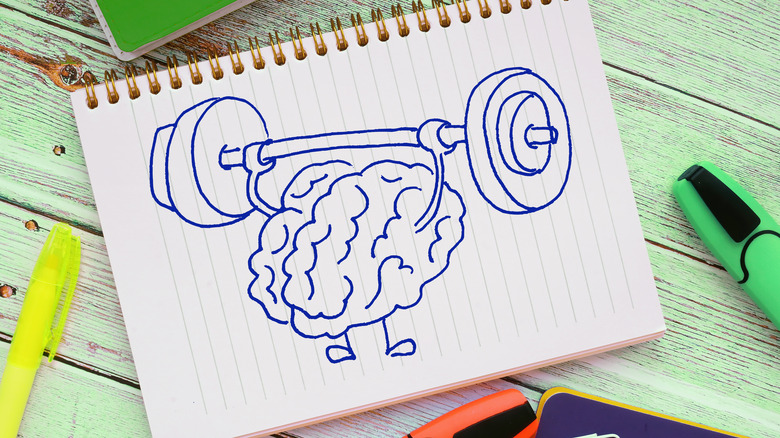The National Alliance on Mental Illness states that in 2024 alone, 1 in 5 U.S. adults experienced a mental illness. The Centers for Disease Control and Prevention (CDC) estimates that more than half of the population will be diagnosed with a mental condition during their lifetime.
Unfortunately, many people may not be aware of how their mental health translates to their physical health. Our bodies are incredibly complex machines, with every part working together in harmony. However, it can’t work in harmony if your brain is struggling to stay at its healthiest. The brain controls everything we do and how our bodies operate. When it’s not feeling its best, there’s a good chance your body isn’t feeling its best, either. The opposite can also be true: When your body feels good, your brain usually feels good. However, according to the World Health Organization, 1 in 4 adults worldwide don’t get enough physical activity, and it could be the cause of more than five million global deaths each year.
Your brain and body want — and need — to work together. Read on to learn the many ways they influence each other, and why it’s crucial to get them both on a path toward good health.
Chronic stress puts wear and tear on your body

Stress can be sneaky. Not only does it affect your mental state, but it also can do damage to your body. One way stress interferes with our physical health is by leading to weight gain. Chronic stress can cause insulin resistance, accumulation of belly fat, insomnia, and food cravings, all of which can pack on the pounds (per U.S. News & World Report).
People who are stressed may also have more inflammation in the body. The immune system causes inflammation as a response to some sort of threat, and it considers stress a threat. When stress is chronic, the chemicals that cause inflammation go unregulated in the body, which can lead to chronic inflammation. Inflammation has ties to lifelong conditions such as rheumatoid arthritis and cardiovascular disease (via Everyday Health).
Research shows that stress can also cause hair loss (via the National Institutes of Health) and contribute to medical conditions like type 2 diabetes, metabolic syndrome, and behavioral disorders (per Yale Medicine).
Physical activity can boost your mood

You may have heard that one of the biggest benefits of exercise is that it makes you feel good. It’s not just talk; there is plenty of scientific evidence to prove that getting physical can improve your mood, even if you’re depressed.
A 2024 study published in JAMA Psychiatry (via Harvard Health Publishing) found that people who exercised more per a tracking device’s measurements were less likely to be at risk for major depressive disorder. Study author Karmel Choi notes that any activity — even taking stairs instead of an elevator — contributes to mood-boosting activity, and that “[the results] didn’t say you have to run a marathon, do hours of aerobics, or be a CrossFit master just to see benefits on depression.”
Another study published in a 2024 edition of Frontiers in Psychology required participants, who were inpatients with mental disorders, to fill out a questionnaire before or after exercising. The questions targeted their attention, mood, social interactions, and more. Interestingly, results showed that after exercising, tiredness decreased while mood, social interactions, and attention increased.
Mental health conditions can disrupt sleep

Sergey Mironov/Shutterstock
If you’re living with a condition that affects your mental health, there’s a good chance that you’ll also suffer from sleep disruptions. According to the National Alliance on Mental Health, about half of people with insomnia may also experience stress, depression, or anxiety. Furthermore, anxiety orders can be a significant cause of sleep disruptions. One scientific review published in Nature of Science and Sleep notes that insomnia is one of many symptoms used to diagnose anxiety and depression disorders.
A lack of sleep can have lots of implications on your physical health. Research has shown that not getting enough sleep — by medical standards, that’s sleeping less than eight hours a night regularly — can lead to obesity, diabetes, and cardiovascular problems. Studies have also shown links to sleeplessness and decreased immune efficiency, increased colds, and a shorter life expectancy (per Harvard Medical School). Healthline adds that sleep deprivation can make you more susceptible to poor coordination, and may result in a higher risk of accidents.
If you or someone you know is struggling with mental health, please contact the Crisis Text Line by texting HOME to 741741, call the National Alliance on Mental Illness helpline at 1-800-950-NAMI (6264), or visit the National Institute of Mental Health website.
A lack of sleep can also contribute to a decreased mental state

Natali Ximich/Shutterstock
We’ve discovered that our mental state can affect our sleep and, therefore, our physical health as well. But not getting enough sleep can also hurt our mental health, resulting in a cycle of negative side effects for the brain and body.
During rapid eye movement (REM) sleep, your brain processes all of your memories and thoughts from the day and categorizes them in a way that should benefit you. You become able to think about everything more clearly, which is why you might feel less stressed in the morning than you were at bedtime. But if you can’t sleep long enough to get into REM sleep, your brain can’t process your emotions the same way. When that happens, you could become more prone to depressive or anxious symptoms (per Sleep Foundation).
A 2024 study published in Preventing Chronic Disease found that participants who slept six or fewer hours during the night were at more than double the risk of frequent mental distress compared with those who had more hours of sleep each night.
People with mental health conditions may pick up bad habits

Andrii Iemelianenko/Shutterstock
Did you know that people with mental health conditions are likelier to smoke? The CDC explains that the 25% of U.S. adults with these disorders are responsible for smoking about 40% of the cigarettes that the smoking population uses. CDC’s Office on Smoking and Health director Tim McAfee tells the American Psychological Association that the uptick could be related to the withdrawal symptoms that people with mental disorders may be more sensitive to. “People with panic attacks, for instance, may have a harder time quitting because the symptoms of withdrawal — such as increased heart rate — can trigger an attack,” says McAffee.
Alcohol usage could be another problem for people with mental health conditions. According to Alberta Health Services, as many as 20% of these individuals also experience a substance abuse problem, and the risk increases to about 50% for those diagnosed with generalized anxiety. A study in the European Journal of Public Health found that participants had decreased mental health when they binged alcohol more frequently than monthly.
If you or anyone you know is struggling with addiction issues, help is available. Visit the Substance Abuse and Mental Health Services Administration website or contact SAMHSA’s National Helpline at 1-800-662-HELP (4357).
Physical activity reduces feelings of anxiety

Fizkes/Shutterstock
When you’re feeling anxious, hitting the gym might not be the first thing you think about doing — but maybe it should be.
According to the Mayo Clinic, physical activity actually releases natural chemicals called endorphins, which can boost your mood rather quickly. Plus, you could get your mind off your current stressors and focus on something more fun and enjoyable. There are also long-term benefits of exercise on anxiety, such as building your confidence and training yourself to manage your anxiety in a healthy way.
The best part is that just about any physical activity can produce these results. One research article from BMC Health Services Research found that high-intensity aerobic exercise was highly beneficial in reducing anxiety symptoms in participants. However, another review in the Journal of Clinical Medicine looked solely at the effects of exercising with virtual reality on individuals with anxiety and depression. Four out of the five reviewed studies reported notable improvements in tension, energy, tiredness, and other symptoms.
Depression could worsen diabetes

Pressmaster/Shutterstock
Diabetes can occur when your body fails to make insulin or use insulin efficiently. The condition comes with several potential side effects, including an increased risk of heart disease, nerve damage, and kidney disease (per the National Institute of Diabetes and Digestive and Kidney Diseases).
If you have depression and diabetes, your mental condition could affect your physical condition. According to a 2024 Journal of General Internal Medicine article, depression can impact the way in which you care for your diabetes. For instance, you could find it more difficult to remember to take your diabetes medications or feel less inclined to exercise or stick to a diabetes-friendly diet, three things that are incredibly important for diabetes management.
WebMD suggests staying on top of treatments for depression so that you can practice better self-care for your diabetes. Therapy should be your go-to source of help, but remembering to take medications, if any, and learning healthy ways to cope with stress can boost your ability to care for yourself.
Depression may be a precursor to cancer

Fida Olga/Shutterstock
Experts still don’t have all the answers as to why some people get cancer and others don’t. However, some believe that your mental health has ties to cancer.
The National Cancer Institute explains that psychological stress happens when you feel intense distress that stems from anything going on in your personal or professional life. While we all experience stress from time to time, chronic psychological stress makes our bodies release stress hormones that have several physical side effects, like rapid heart rate and high blood pressure. Many of these physical effects are also tied to certain types of cancer. Even more importantly, severe stress can cause people to pick up cancer-causing habits, such as binge eating or smoking.
Some research goes a step further to suggest that depression could be a key part of the progression of cancer. “Many people don’t realize cancer itself can lead to the release of molecules that enter the brain and cause depressive symptoms even before the cancer is discovered,” says Dr. Andrew H. Miller, a professor of psychiatry and behavioral sciences (via CURE). As Miller explains, when cancer is detected by the immune system, it causes inflammation that can consequently trigger symptoms of depression (including mood changes and a lack of concentration).
Some physical conditions can lead to mental health issues

Elnur/Shutterstock
Your mental health can play a role in your physical health, but the opposite is also true. When you’re stricken with an illness, injury, or chronic medical condition that affects your daily life, it could send your mental wellness into a downward spiral.
Chronic illnesses can prevent or limit you from working, maintaining relationships, attending social functions, and keeping up with daily tasks like you once had. It’s possible that you might feel helpless, withdrawn, and stressed about life in general as the condition takes a toll on your body (via Cleveland Clinic).
The National Institute of Mental Health says that people with chronic conditions have a higher risk of developing depression, including those with diabetes, hypothyroidism, forms of dementia, autoimmune diseases, or cancer. It also emphasizes the critical need for those with an injury, illness, or chronic condition that’s affecting their lives to care for their mental health. Proper care starts with speaking with a health care provider to discuss options.
A good diet can improve both your mental and physical health

Rido/Shutterstock
Ask almost any doctor, and they’d probably agree that when you fuel your body, you fuel your mind. One study conducted by Edith Cowan University researchers in 2024 explored this by asking participants to complete a seven-week cooking course that taught them how to prepare healthy meals and improve their diets. Overall, those who completed the course felt better prepared to transform their diets long-term. Even more importantly, the participants’ mental health “significantly improved” after completing the cooking course.
Why did this happen? According to Harvard Health Publishing, your brain seeks high-quality foods for its nourishment to stay focused, alert, and on top of your bodily processes. Compared to a Western diet (which is often high in sugar and processed foods), a traditional unprocessed, whole-food diet can lower the risk of depression by as much as 35%. “We tend to separate our brain from the rest of our body, but good health means good health from a holistic perspective — from head to toe,” Dr. Gabriela Cora, a board-certified psychiatrist, tells Aetna.
Poor mental health can be bad for your heart

Billion Photos/Shutterstock
Do you feel stressed more often than not? Are depression or anxiety taking over your daily life? If so, your mental health symptoms could be damaging your heart. According to the CDC, post-traumatic stress disorder, anxiety and mood disorders, and chronic stress are commonly associated with heart disease.
According to Johns Hopkins Medicine anxiety specialist Una D. McCann, anxiety disorders can significantly impact heart disease because they interfere with sleep, increase blood pressure and heart rate, and lower heart rate variability. Individuals with anxiety may also find it difficult to distinguish between panic attacks and heart attacks, potentially preventing them from seeking medical help.
An article published in Cardiorenal Medicine took a closer look at how psychological stress affects high blood pressure, a key indicator of heart disease risk. Researchers pulled data from the National Health Interview Survey (NHIS) between 2004 and 2024 and found that individuals with psychological stress were 1.5 times likelier to have high blood pressure than those without psychological stress.
Depression can make it difficult to lose weight

Beauty Studio/Shutterstock
A 2024 NCHS data brief found that 43% of adults living with depression were also obese, and that obesity rises as the severity of depressive symptoms increases. However, the specific link between the two has been unclear, despite years of research connecting them. For instance, a 2025 review published in Psychiatry Investigation pulled data from 18 articles covering multiple studies. Ultimately, the authors found that obesity and depression are both risk factors for each other.
Although depression can cause weight loss as a result of mood and appetite changes (per Healthline), it could also have the opposite effect. The complexities of depression can cause significant weight changes in some, and psychiatry and pharmacology professor Roger McIntyre tells WebMD that it involves much more than just not being motivated to eat healthily or work out when you’re depressed. McIntyre explains that depression can affect impulse control and make a person feel less satisfied after eating, causing binging or even food addiction. Plus, the higher production of the stress hormone cortisol can affect food cravings and increase insulin resistance, making it difficult to lose weight.
Physical activity can strengthen your brain

Yuriy K/Shutterstock
Working your body can do a lot for your brain, too! According to Harvard Health Publishing, exercise can boost cognition, making your thinking and memory processes work better. That’s because as soon as you start exercising, your body goes to work on processes that are good for your brain, such as decreasing inflammation and producing chemicals and hormones that our minds need for strength and growth. Also, physical activity can improve your sleep and overall mood, which are also necessary for brain health.
A 2024 scientific review in Frontiers in Psychology explored the link between exercise and the brain by examining multiple relevant studies. Some studies found that animals who participated in high-intensity activity had changes in serotonin levels and increased neuron activity in the brain. Studies on humans found that people of any age who participated in physical activity had better memory capabilities, executive control, and overall cognitive functioning. Some reviewed studies even found that cognition reduction due to aging was somewhat preventable with exercise.
Exercising can help you overcome trauma

DisobeyArt/Shutterstock
Many studies have focused on the benefits of physical activity for people experiencing post-traumatic stress disorder (PTSD). A 2024 review in Frontiers in Psychology pulled data and results from several of these studies and found that the benefits were clear. Participants in multiple studies who engaged in aerobic activity had reduced inflammation, improved hypothalamus regulatory activities, and increased their overall cognitive function. The authors noted that these positive side effects are crucial enough for the well-being of people with PTSD that they suggest exercise as a form of mental health treatment.
Some exercise even targets trauma and works to release it from the body. Bioenergetics is a type of science that studies how energy moves in living organisms. Some bioenergetics enthusiasts believe that by practicing certain types of physical activity, bad energy can move out of the body so that good energy can enter, which can be an effective way of dealing with trauma (via The Guardian). Somatic therapy, which focuses on how you feel physically through body-focused exercise, can also help release trauma.



